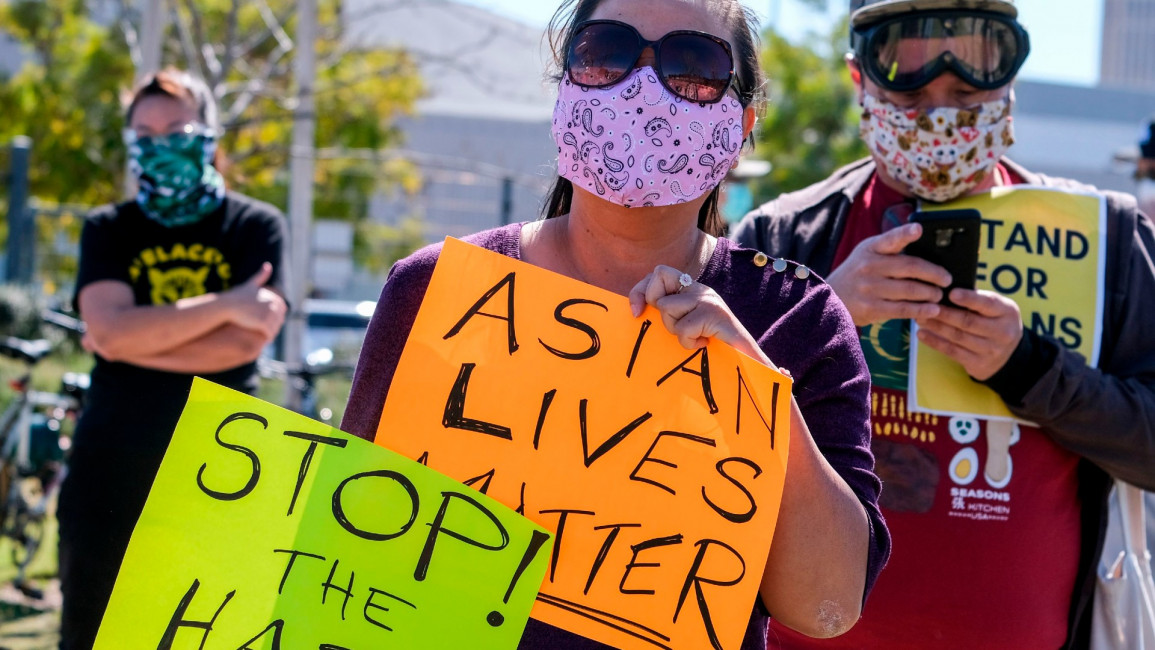
To Asian-Americans: Your Muslim compatriots stand with you against racism
I've been following recent reports of the rise in hate crimes against members of your community with a heavy heart. As an American-Muslim, I know very well the devastating impact of misinformation, ignorance, and propaganda.
It's the combination of those very things that led to 73 percent of American adults to view China unfavourably in a recent survey. A few years ago, those same factors are also what caused only 27 percent of Americans to say they had a positive view of Muslims - statistics that fare much worse during election cycles and periods of national crises.
There is a flood of parallels between what Asian-Americans are experiencing and what the Muslim community has faced for the last 20 years. You see, it almost always follows the same trajectory: Difficult times and uncertainty lead people to experience fear and anxiety. These worries lead to irrational behaviour, anger, and the need to find an individual or group to blame.
Behavioural science studies have found that the tendency to shift blame is socially contagious, and when the public blaming stems from a leader, its effects are far more detrimental.
 |
As an American-Muslim, I know very well the devastating impact of misinformation, ignorance, and propaganda |  |
The unfounded fears, energized by massive, deliberate media campaigns and amplified by agenda-driven politicians and pundits, are at the root of this discrimination. Islamophobia has as little to do with what Islam teaches as Sinophobia has with the reality of this pandemic's cause and spread. But both xenophobic productions have led to bigotry and personal and collective harm.
The rise of Islamophobia saw the number of anti-Muslim hate groups in the US nearly triple between 2015 and 2016, emboldened by the fear-mongering, divisive rhetoric of Donald Trump.
Perhaps you don't remember when Trump said "Islam hates us" on national television. And that's understandable, because if you're not directly affected, the words sting less and the repercussions are virtually nil.
Twitter Post
|
But the Muslim community certainly felt the impact of Trump's anti-Muslim sentiment on many fronts, best quantified in a 67 percent increase in hate crimes against Muslims in 2015, according to the FBI.
This is the same man responsible for fanning the flames of hate against the Asian community. Instead of addressing his failures in dealing with Covid-19 in our country, Trump shifted the blame to the easiest target: the Chinese. He publicly called it the "China plague" and resorted to juvenile and racist jabs like "kung flu" to amplify the insult.
Read more: Florida's new anti-protest bill threatens an even tighter chokehold on Black and Brown communities
The result? 122 incidents of anti-Asian hate crimes were reported in 2020 - an increase of 150 percent.
Of course, not only the Chinese were impacted. Asian-Americans of many backgrounds have faced waves of violence and racism as a result. Similarly, not only Muslims are affected by anti-Muslim prejudice. Christian Arabs and Sikhs have also been verbally and physically harassed, discriminated against, and even killed since 9/11 because they were mistaken for Muslims.
Twenty years. That is how long the Muslim community has been collecting reports of discrimination and violence, of school bullying and workplace inequity, of violations of constitutional rights, of hate incidents and hate crimes.
That is how long the Muslim community has organised unprecedented activism on interfaith, social, humanitarian, and political fronts.
And all the while, Muslim leadership has been actively working to educate, empower, and protect American-Muslims. Civil rights organisations like CAIR-Florida where I work, offer Know Your Rights training to our community that covers a range of areas where discrimination is rampant: school, work, housing, prison and travel.
These organisations stand ready to defend victims of discrimination through advocacy or litigation.
Asian-American leaders have also mobilised in clear efforts to educate and protect their community. As grandchildren are now experiencing the violence and discrimination that their grandparents likely encountered in this country, it is critical to be aware of what to expect, and proactive in how to respond.
 |
The same advice we share with our community, I pass along to you |  |
The same advice we share with our community, I pass along to you: be vigilant, be wise, try to avoid being alone, especially at night, know your rights, have a plan, know who to call if you're in trouble, and be sure to report any type of discrimination or assault to the proper authorities.
The tides of favour toward minority groups ebb and flow in this country, triggered by seemingly any opportunity to promote division and fear. Even with "warmer" views of Islam and Muslims in recent years, we are far from where we need to be as a nation in our tolerance of one another. The mere necessity for these types of surveys speaks volumes.
But, my fellow countrymen from the Asian-American community, this too shall pass.
Unfortunately, though, if the trajectory of history remains consistent, it will be at the expense of the next minority group. Muslims may feel a sense of liberation and relief that we are no longer the main target of such threats. But it is critical we never forget, and it is imperative that we never join the contagious chorus of blame shifters, just because we, too, are uncertain, or afraid.
Hiba Rahim is an American Muslim activist and community organiser. She is a graduate of Florida State University's International Affairs Masters program and currently works for the Council on American-Islamic Relations - Florida.
The views expressed in this article are those of the author and do not reflect the views of CAIR-Florida, its leadership, or staff.
Follow her on Twitter: @rahim_hiba
Have questions or comments? Email us at: editorial-english@alaraby.co.uk
Opinions expressed in this article remain those of the author and do not necessarily represent those of The New Arab, its editorial board or staff.



